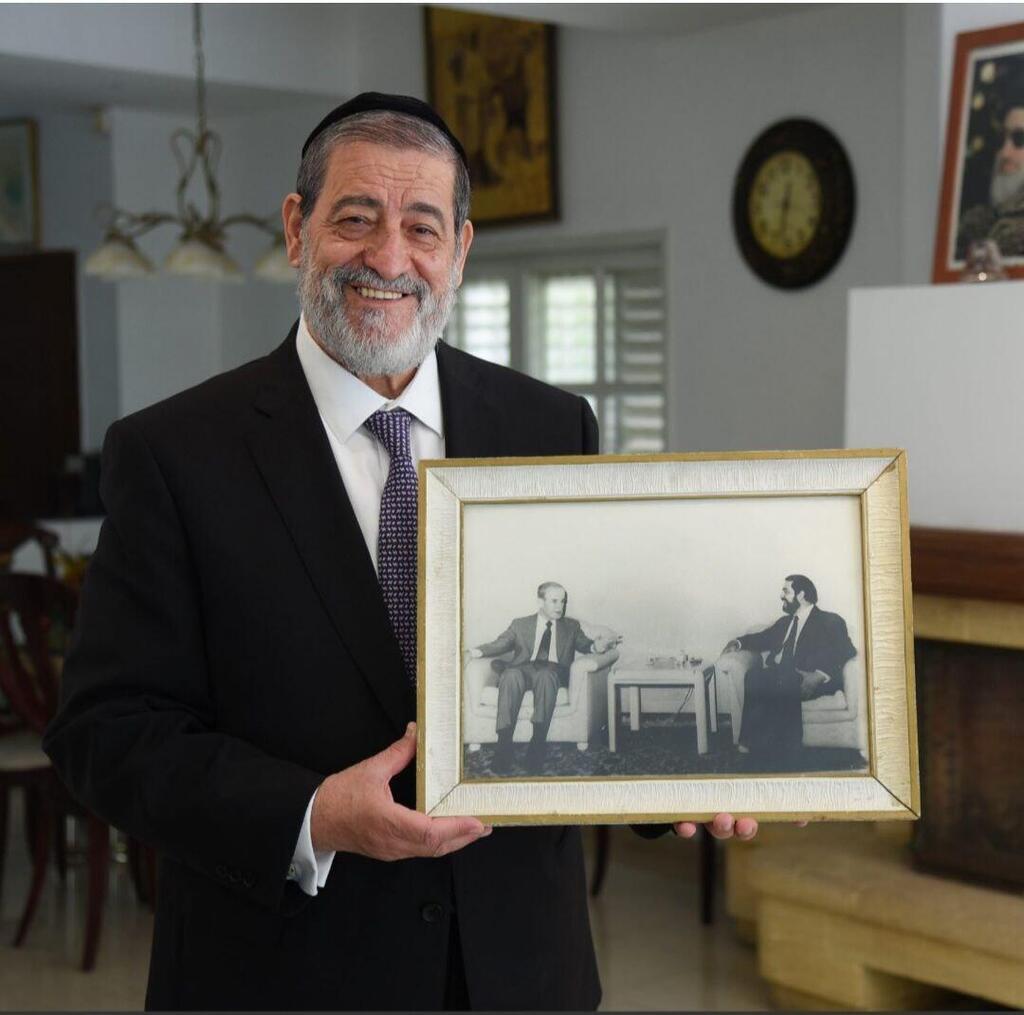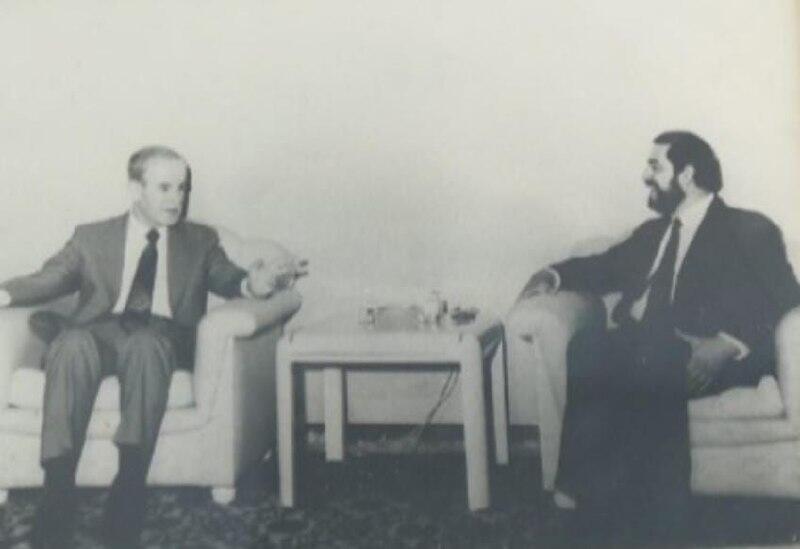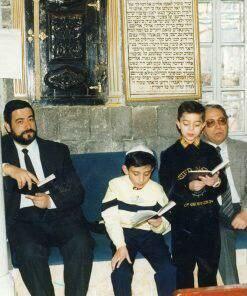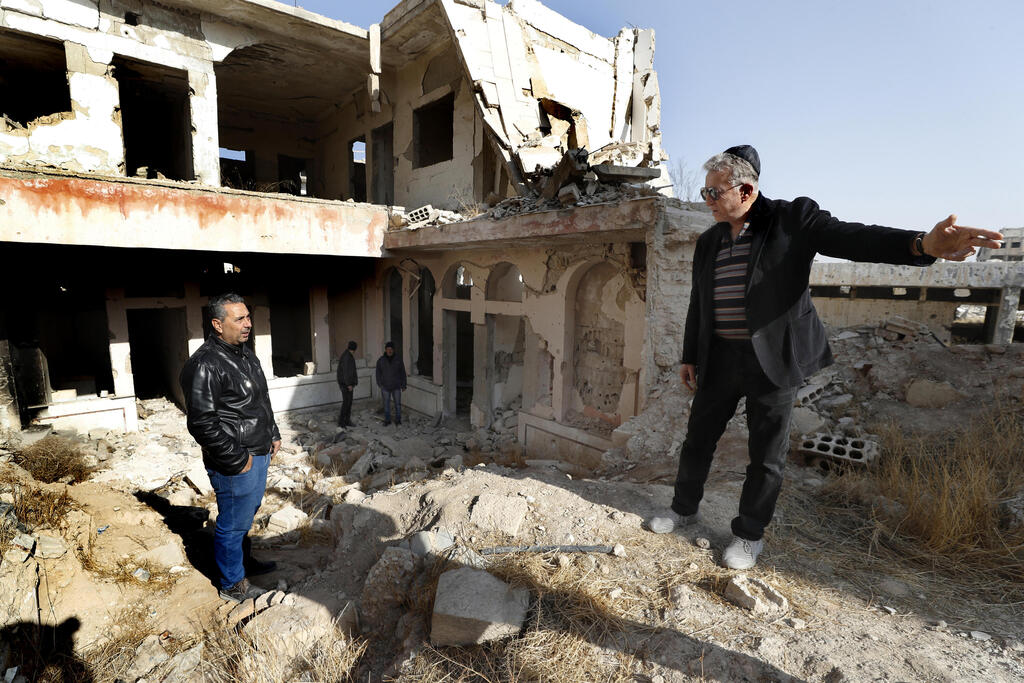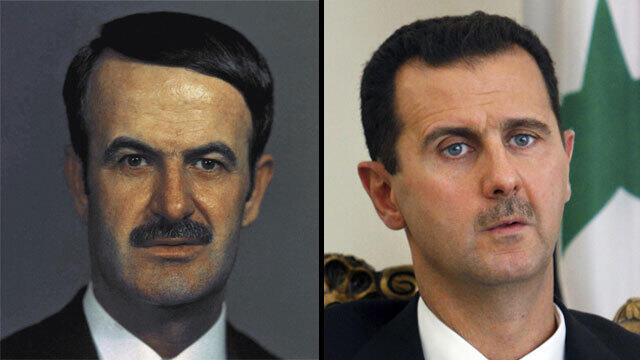Getting your Trinity Audio player ready...
The late Rabbi Avraham Hamra, who was Syria's chief rabbi, passed away three and a half years ago. His son and successor, Rabbi Binyamin Hamra, reveals new details from the historical Jewish community, addresses the new government in Syria, and expects it to preserve Jewish heritage sites after the coup and the escape of former President Bashar Assad to Russia.
In an interview with the website Behadrei Haredim, he shared some lesser-known information about his father, which the family only learned towards the end of his life.
Syrians dismantle the statue of Hafez Assad in Homs
Seven years ago, Mossad officials came to visit Rabbi Avraham and comfort him after the death of his daughter and her three children, who perished in a fire. The Mossad officials said during the visit that there were things that the family members would never discover. Rabbi Binyamin clarifies that his father was not a spy, but he certainly did unusual things that are not usually expected of a rabbi.
Rabbi Avraham Hamra was the Chief Rabbi of Syria and served as a member of the Presidency Council of the Union of Rabbis in Islamic Countries. He was born in Damascus in 1943, was a teacher in the Jewish school at the age of 16, and at the age of 19 was appointed to be the principal of the school. In 1972, he became deputy to Rabbi Nissim Nadav HaCohen, who served as Chief Rabbi of Damascus.
In the 1980s, Rabbi Hamra raised the issue of Syrian Jews leaving the country in public discourse. The rabbi worked with President Hafez Assad to allow members of the Jewish community to leave, and Assad authorized them to leave for all countries in the world except Israel.
The Chief Rabbi was very connected to senior regime officials. During one of the meetings with the head of the secret police, the rabbi’s eight-year-old son talked to the high-ranking guest, played chess with him, and even beat him. When Rabbi Hamra heard about this, he made it clear to the boy: “We must not beat them, we must lose to them” – so that they would not be offended.
Rabbi Binyamin says that in the 1960s his father began to manage the Jewish community, and did a lot for the Jews of Syria. He worked with unknown elements from all over the world to bring about the departure of the Jews from Syria. The son says that Jews were forbidden to leave the Jewish Quarter within three kilometers of the city without permission, and if someone wanted to go abroad, they had to leave two family members in Syria as a guarantee that they would return.
According to Rabbi Binyamin, it was forbidden to learn Hebrew in Syria, and his father looked for creative ways to teach the children Hebrew so that they could pray and study Torah. He managed to incorporate all the necessary religious studies into the prayer, since according to Syrian law, every religion was allowed to pray in its own language.
Once, the director in charge of Talmud on behalf of the government was surprised and wondered, "What kind of prayer do you have that takes so many hours?" - and the rabbi replied that in order for the children to be able to pray in their own language, as agreed upon by law, they had to be taught the Holy Language. He showed him the "long prayer text" from the book "Law of Israel" divided by days, which also contains the Bible, Mishnah and Gemara.
In order not to arouse suspicion, the rabbi would write with "half a quill", half a tongue The holy book was written by Rashi, who told the authorities that it was the ancient Jewish script in which they studied Torah. It was very difficult to bring Jewish holy books into Syria from abroad, and it was almost impossible to print books there.
Meeting the dictator
The late Chief Rabbi also managed to soften the heart of President Hafez al-Assad, Bashar's father, who was in power until his death in 2000. On one of the Fridays, Syrian presidential elections were held in which the president won by a fairly high percentage, as usual. The late Rabbi Hamra led all of Syria's Jews in a huge procession with signs in Hebrew supporting Assad and conveyed a message of support of the president in Hebrew.
The president was enthusiastic about the signs in Hebrew, and told the rabbi, pointing to his beard: "I will not forget this beard for you." Over the years, the rabbi has helped many Jews leave Syria. In one case, two Jewish brothers, Eli and Salim Swed, were imprisoned in a Syrian prison for visiting Israel. Rabbi Binyamin says that his father met with President Assad to ask him to grant a pardon to the Swed brothers and to allow Syrian Jews to leave the country.
Just before he entered, one of Assad's close associates told the rabbi not to mention the Swed brothers. Rabbi Binyamin says that fortunately for his father, Assad himself said: "What's the fuss about one Jew who broke the law and went to prison?" The rabbi told him: "If I may, it's not one, it's two brothers. The mother is dying, and I ask that perhaps Give them amnesty, so that they can celebrate Passover."
Assad told the rabbi that it was too late, because he had already forwarded the list of recipients of the amnesty. The rabbi replied to the president: "It is not difficult for Hafez al-Assad to grant another amnesty." At the end of the meeting, he added: "Mr. President, can I take your word that the two will be with us on Passover?" And Assad was true to his promise. The two were released after more than four years in prison, and they celebrated the seventh of Passover in 1992 in the community.
In 1994, Rabbi Avraham Hamra left Syria. The Jews who left Syria arrived in the United States, but it was not easy. Rabbi Hamra worked to ensure that they arrived in the United States only after they received American citizenship, so that they would not be refugees without rights, and worked on the issue with President George H.W. Bush. The rabbi himself eventually left when all the Jews who wanted to leave were already outside of Syria. He immigrated to Israel and lived in Holon until his death in 2021. After his death, the Assad regime sent a letter of condolence to the family.
Rabbi Binyamin says that his father asked his children at the time if they wanted to immigrate to Israel. They wanted to stay in the United States, where they had come from Syria (since this was Assad's condition), but Rabbi Avraham decided to immigrate to Israel. After the father of the family passed away, his son was appointed to continue his path and serve as the chief rabbi of Syrian Jews. Rabbi Binyamin leads the Syrian community from Holon, and is promoting processes to establish a spiritual community center for the Jewish community. Rabbi Benjamin says that the Syrian Jewish community in Israel has followed the drama of the fall of the regime with interest, noting that today there are only nine Jews in Syria, women and men, the youngest of whom is about 75 years old.
Get the Ynetnews app on your smartphone: Google Play: https://bit.ly/4eJ37pE | Apple App Store: https://bit.ly/3ZL7iNv
AP reported this week that after the fall of the regime, the head of the Jewish community in Syria, Bechor Khamentov, was able to revisit the ruins of the Elijah the Prophet synagogue on the outskirts of Damascus, which is considered one of the oldest synagogues in the world. The civil war in Syria left the synagogue abandoned and partially destroyed.
"Everyone who sees the pictures is truly heartbroken, how the synagogue, perhaps the oldest in the world, was destroyed and is being destroyed," said Rabbi Binyamin Hamra. "It was the talisman of the synagogues in Syria. We expect, hope, pray and ask all parties to preserve the synagogues that are very important to us. Every religion preserves its tradition, Christians, Muslims and Jews preserve tradition, it has been that way in every generation and this is what we expect from everyone. With God's help, we will deserve complete redemption."






